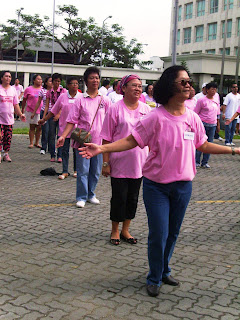I found this interesting article in the internet today. I am aware that medical practitioners and researchers have always raised an eyebrow towards the claim that stress can contribute to breast cancer risk. However, my own instinct and intuition tells me that stress did play a big part in the development of my cancer.
I could not totally erase from my mind that on March 2006, biopsy results on my two-centimeter or so lump stated that it was benign. Regretfully I wasn't able to have the lump immediately removed because of the subsequent events in my life which culminated in the hospitalization and tragic death of my mother. Ten months after, my lump had grown to six centimeters and had developed into Stage 3 cancer.
STUDY LINKS STRESS TO THE RISK OF BREAST CANCERby Clair Weaver
STRESSED career women may be at higher risk of developing breast cancer, according to new research.

Those working in the most high-pressure jobs have been found to be 30 per cent more likely to be diagnosed with the disease, which is the biggest female cancer killer among Australian women.
A study of more than 36,000 women, published in the journal Epidemiology this month, reveals a link between workplace stress and heightened breast cancer risk.
The finding is controversial, as past research and doctors have ruled out stress as a significant risk factor.
"Women with both low job control and high job demands had higher risk of breast cancer than women with high job control and low demands," the study found.
Breast cancer is on the rise in Australia, affecting more than 11,700 women a year and killing 2600, but survival and detection are also improving.
Sue Carrick, head of research strategy at the National Breast Cancer Foundation, said it was difficult to measure and compare stress levels.
"What is important to note is that although we have a much greater understanding of some risk factors for breast cancer, we still do not understand the causes of the majority of breast cancers," she said.
She said the biggest known risk factors were getting older, with the disease peaking in women aged 45 to 69, being overweight, post-menopause and drinking four or more standard drinks a day.
Hormone replacement therapy, having children later in life or not at all and a family history have also been identified as risk factors.
To mark the start of Breast Cancer Month, the foundation has announced $10 million in funding to go towards finding better treatments for women with advanced breast cancer.
The Job Strain And Risk Of Breast Cancer study found no increased risk in women who worked part-time. It has been suggested stress may raise levels of estrogen, which can boost the risk of hormone-dependent breast cancer.
Sydneysider Amanda Maltabarow, 49, was in a high-powered marketing job when she was diagnosed with invasive breast cancer five years ago.
She has been taking the drug Tamoxifen since having a breast, ovaries and lymph nodes removed.
"I definitely think stress was a contributing factor," she said.
"I was a mum, I had a career, I was saying yes to everything, trying to be a corporate wife and splitting myself in 50 ways – I never relaxed and just enjoyed my life and family."
 Christa Slotbloom is a breast cancer survivor who continues to chronicle her journey through eloquent and honest photographs.
Christa Slotbloom is a breast cancer survivor who continues to chronicle her journey through eloquent and honest photographs. 














